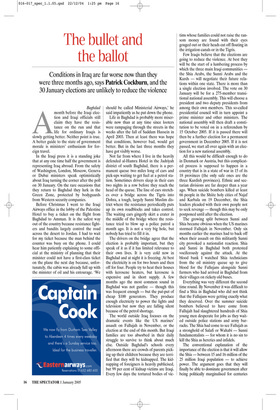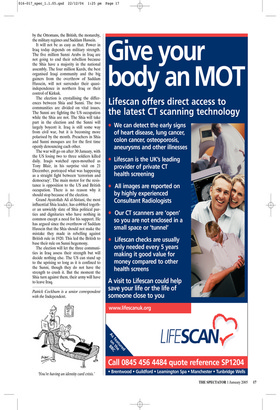The bullet and the ballot
Conditions in Iraq are far worse now than they were three months ago, says Patrick Cockburn, and the 30 January elections are unlikely to reduce the violence Baghdad Amonth before the Iraqi election and Iraqi officials still claim they have the resistance on the run and that life for ordinary Iraqis is slowly getting better. Neither point is true. A better guide to the state of government morale is ministers’ enthusiasm for foreign travel.
In the Iraqi press it is a standing joke that at any one time half the government is representing Iraq abroad. From the safety of Washington, London, Moscow, Geneva or Dubai ministers speak optimistically about Iraq turning the corner after the poll on 30 January. On the rare occasions that they return to Baghdad they lurk in the Green Zone, protected by bodyguards from Western security companies.
Before Christmas I went to the Iraqi Airways office in the lobby of the Palestine Hotel to buy a ticket on the flight from Baghdad to Amman. It is the safest way out of the country because resistance fighters and bandits largely control the road across the desert to Jordan. I had to wait for my ticket because the man behind the counter was busy on the phone. I could hear him patiently explaining to some official at the ministry of planning that their minister could not have a first-class ticket on the plane the next day because, unfortunately, the cabin was already full up with the minister of oil and his entourage. ‘We should be called Ministerial Airways,’ he said impatiently as he put down the phone.
Life in Baghdad is probably more miserable now than at any time since looters were rampaging through the streets in the weeks after the fall of Saddam Hussein in April 2003. Then at least there was hope that conditions, however bad, would get better. But in the last three months they have got visibly worse.
Not far from where I live in the heavily defended al-Hamra Hotel in the Jadriyah district of south Baghdad, there is a permanent queue two miles long of cars and pick-ups waiting to get fuel at a petrol station. Sometimes drivers sleep in their cars two nights in a row before they reach the head of the queue. The line of cars stretches over a bridge across the Tigris into Dohra, a tough, largely Sunni Muslim district where the resistance periodically puts up its own roadblocks and takes control. The waiting cars gingerly skirt a crater in the middle of the bridge where the resistance tried to blow up a police patrol a month ago. It is not a very big hole, but nobody has tried to fill it in.
The drivers on the bridge agree that the election is probably important, but they speak of it as if it has limited relevance to their own lives. It is very cold now in Baghdad and at night it is freezing. At best the electricity is on for two hours and then off for four. People try to heat their houses with kerosene heaters, but kerosene is expensive and in short supply. A few months ago the most common sound in Baghdad was not gunfire — though this was frequent enough — but the put-put of cheap $100 generators. They produce enough electricity to power the lights and television but now they are falling silent because of the petrol shortage.
The world outside Iraq focuses on the dramatic events like the US marines’ assault on Fallujah in November, or the election at the end of this month. But Iraqi families are too absorbed in their daily struggle to survive to think about much else. Outside Baghdad’s schools every afternoon there are crowds of parents picking up their children because they are terrified that they will be kidnapped. The kidnapping of foreigners is heavily publicised, but 99 per cent of kidnap victims are Iraqi. Every few days the tortured bodies of vic tims whose families could not raise the ransom money are found with their eyes gouged out or their heads cut off floating in the irrigation canals or in the Tigris.
Few Iraqis believe that the elections are going to reduce the violence. At best they will be the start of a lumbering process by which the three main Iraqi communities the Shia Arabs, the Sunni Arabs and the Kurds — will negotiate their future relations within one state. There is more than a single election involved. The vote on 30 January will be for a 275-member transitional national assembly. This will choose a president and two deputy presidents from among their own members. This so-called presidential council will in turn appoint a prime minister and other ministers. The national assembly will then draft a constitution to be voted on in a referendum by 15 October 2005. If it is passed there will then be a further election for a permanent government in December 2005. If it is not passed, we start all over again with an election for a new national assembly.
All this would be difficult enough to do in Denmark or Austria, but this complicated process is supposed to happen in a country that is in a state of war in 15 of its 18 provinces (the only safe ones are the three Kurdish provinces). Ethnic and sectarian divisions are far deeper than a year ago. When suicide bombers killed at least 66 people in the Shiite holy cities of Najaf and Karbala on 19 December, the Shia leaders pleaded with their own people not to seek revenge — though this may be only postponed until after the election.
The growing split between Sunni and Shia became obvious when the US marines stormed Fallujah in November. Only six months earlier the marines had to back off when their assault on this militantly Sunni city provoked a nationalist reaction. Shia and Sunni in Baghdad both protested vociferously against the attack. At the blood bank I watched Shia technicians from the oil ministry queue up to give blood for the Fallujans alongside Sunni farmers who had arrived in Baghdad from their villages on rickety old buses.
Everything was very different the second time round. By November it was difficult to find a Shia in Baghdad who did not think that the Fallujans were getting exactly what they deserved. Over the summer suicide bombers believed to have come from Fallujah had slaughtered hundreds of Shia young men desperate for jobs as they waited outside police stations and army barracks. The Shia had come to see Fallujah as a stronghold of Salafi or Wahabi — Sunni fundamentalists — for whom it is no sin to kill the Shia as heretics and infidels.
The conventional explanation of the importance of the election is that it will allow the Shia — between 15 and 16 million of the 25 million Iraqi population — to achieve power. The argument goes that they will finally be able to dominate government after being politically marginalised for centuries by the Ottomans, the British, the monarchy, the military regimes and Saddam Hussein.
It will not be as easy as that. Power in Iraq today depends on military strength. The five million Sunni Arabs in Iraq are not going to end their rebellion because the Shia have a majority in the national assembly. The four million Kurds, the best organised Iraqi community and the big gainers from the overthrow of Saddam Hussein, will not surrender their quasiindependence in northern Iraq or their control of Kirkuk.
The election is crystallising the differences between Shia and Sunni. The two communities are divided on vital issues. The Sunni are fighting the US occupation while the Shia are not. The Shia will take part in the election and the Sunni will largely boycott it. Iraq is still some way from civil war, but it is becoming more polarised by the month. Preachers in Shia and Sunni mosques are for the first time openly denouncing each other.
The war will go on after 30 January, with the US losing two to three soldiers killed daily. Iraqis watched open-mouthed as Tony Blair, in his surprise visit on 21 December, portrayed what was happening as a straight fight between ‘terrorism and democracy’. The main motor for the resistance is opposition to the US and British occupation. There is no reason why it should stop because of the election.
Grand Ayatollah Ali al-Sistani, the most influential Shia leader, has cobbled together an unwieldy slate of Shia political parties and dignitaries who have nothing in common except a need for his support. He has argued since the overthrow of Saddam Hussein that the Shia should not make the mistake they made in rebelling against British rule in 1920. This led the British to base their rule on Sunni hegemony.
The election will let the three communities in Iraq assess their strength but will decide nothing else. The US can stand up to the uprising so long as it is confined to the Sunni, though they do not have the strength to crush it. But the moment the Shia turn against them, their army will have to leave Iraq.








































 Previous page
Previous page